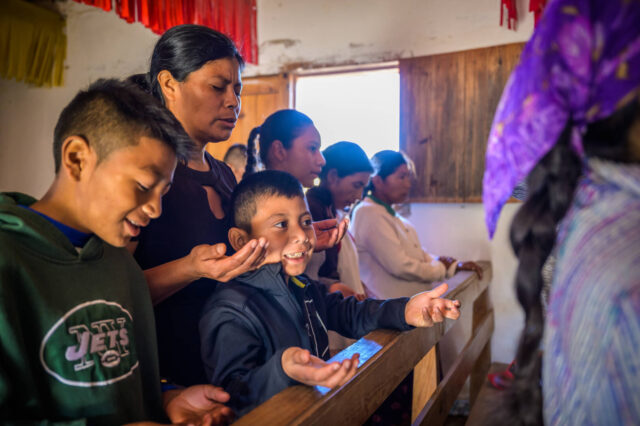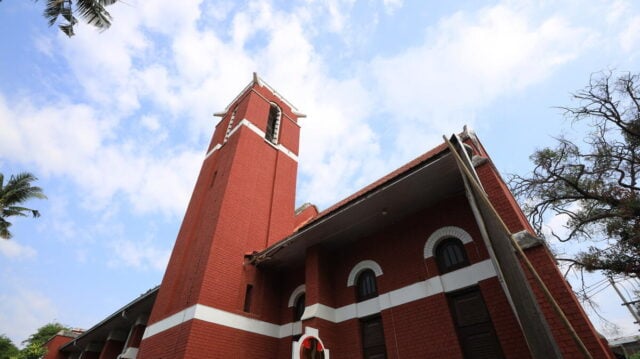When Jennifer Nettles was 6 years old rehearsing as part of a children’s play at her church, the children’s choir director noticed something special.
That led to a conversation with Jennifer’s mother, saying, “Jennifer can really sing. You should think about getting her into music and piano.”
“She also happened to be the town piano teacher, so it worked out well for everybody,” Jennifer says with a laugh. “But I’m so grateful that she was there and had a musical ear and could recognize and encourage.”
Fast forward, and Jennifer is now the lead singer of the country superstar and Grammy-award-winning group, Sugarland.
Jennifer is heading out on a Christmas tour and is partnering with World Vision. She’ll also be appearing at World Vision’s Give-back Gift Shop in New York City’s Bryant Park in late November. We sat down and spoke with her about Christmas, generosity, and her partnership with World Vision.
What are you most excited about for your upcoming Christmas tour?
I’m excited about two pieces:
- I get to perform Christmas music because there’s only one time of year whenever you get to do it.
- I also am looking forward to getting to celebrate that spirit of Christmas musically with my fans and with people all over in the different towns in which I’m touring and traveling. Celebrating music is one thing. Celebrating this specific music that’s obviously connected with this holiday is even more special.
What would you say is your favorite Christmas song?
There are so many good Christmas songs. In terms of the sacred Christmas songs, I love, “O Holy Night.” I love the chorus. That, “Fall on your knees” is just so powerful — the image of being humbled and of worshipping and offering praise. I find it to be so poetic and so beautiful, and I love that song. And melodically, the music matches the words there. That’s probably my favorite.
What does the phrase “the spirit of Christmas” mean to you?
The spirit of Christmas is a lot of things, but for me, it’s the fact that the Christmas tradition centers around the hope of a child. And in the Christian tradition, obviously that is the Christ child being born. That hope that that birth symbolized to me is so beautiful and so special and so unique even within the context of world religions that hope comes from a child. For all of us, when we look at our children and the younger generations, that is where our hope lies — in these children.
That’s also why we celebrate it so much with them. When we think about the more secular parts of Christmas that are with Santa Claus, it’s all about that anticipation and excitement of all these gifts and the joy that we as parents get to watch our kids enjoy opening presents. So I love that it is a holiday that’s really centered around children.
What’s one of your favorite things about children?
One of my most favorite is their sense of wonder, and that’s attached to their sense of discovery — and that they can still be surprised, and they can still have wonder and awe at the world, and things feel magical. As an adult, we become desensitized. We can become, heaven forbid, cynical or jaded. Getting to experience the world through the eyes of a child and with that wonder is, for me, so delicious.
Besides material things, what are some of the best gifts that we can give children?
Besides the material gifts, there are so many gifts that we have been given that we can pass on to our children — the gift of kindness, the gift of compassion, the gift of curiosity. I think both compassion and kindness spring from curiosity — most all good things spring from curiosity in the sense that we want to see the world, we want to see other things, we want to know what is possible. And if you want to know what is possible, that means you want to know what the best things that could possibly happen are. So if we see a problem, how can we fix it? A sense of curiosity makes us solution-oriented. It helps us figure out creative solutions to problems that may seem insurmountable.
When you see those problems in the world, how does it inspire you to be part of the solution?
We have found ourselves right now in very interesting and challenged times. In some ways, for me, they’re very scary times when I think about being a mother, and I think about having a son who is going to grow up in a world that we, right now, are creating. I feel really charged to make it as kind and the best world that it can be for him and, really, for everybody’s children. Generosity and compassion are more important now than they have ever been.
Humanizing people is super important. We are so constantly barraged with information that people look like statistics — they don’t look like human beings. We hear numbers. To our own detriment, we are so data driven. We worship it as if it were a god in many ways because we shift and change our whole culture based on numbers. There’s a beauty in numbers because there’s certainty, but how those numbers come about, and how those statistics happen, and how they are presented to us, that’s tricky work. But what isn’t tricky is face-to-face humanity. Brene Brown says it is very difficult to hate someone when you are face to face with them. Unfortunately, we cannot go to lunch with the world. I wish we could — we would be better human beings for it.
Having the ability to interact with people and to put ourselves out there [helps]. We are so insulated. We talk about how connected we are on the internet. Maybe we should also be just as connected within our human being, flesh-and-blood communities. I hope that there will be more of a push toward that because being in front of someone does foster that generosity and compassion. Division, being more sectarian, being more separated, staying in our homes only, not getting out, not seeing something that is different than our day to day — that is not going to serve us.
How do you teach your son about kindness and compassion?
Magnus is 4-and-a-half, so these kinds of lessons of generosity are just starting to be understood because it’s such an abstract concept. It’s important to give to people who don’t have as much as we have all been blessed with. With my mom, we try to sponsor a family within the community that needs help in terms of their gifts for children, who may not have anything to open on Christmas. I’m hoping that he’s going to be able to learn lessons from that.
Why is it important to you to help children in need?
What we give also comes back to us. I feel very blessed to be able to provide for my family. I can’t imagine what it must feel like to not be able to, and it’s double the sadness in that way to not only not be able to provide for yourself, but if you were to watch your children go hungry, I can’t imagine. For that reason specifically, being able to help other children all over the world is massively important.
Obviously children grow up, and they become adults. We remember the kindnesses that we were shown — and we also remember the unkindness that we are shown. That becomes a foundation of who we are, in a way, and who we are grows from that. So it’s important to be able to spread as much kindness as possible so that that can continue to proliferate.
As a mother, how does it make you feel when someone comes alongside and really loves on your own son and family?
An author that I love has a saying that there’s no such thing as other people’s children. What that really means is we are responsible to and for each other in this world. So for me, there is no such thing as too much love for your child. The more, the merrier.
We all know that there will be those moments in life where we are made to feel lesser than, or where we are challenged in our self-worth. And being able to pull from a really strong foundation of knowing that you are so well loved, I say bring it on. I love to see him be able to enjoy and be celebrated and be loved by other people. To be able to have a sense of self-worth and feel loved from a community is a beautiful gift.
When did someone come alongside you, and how did that impact your life?
Growing up in a small town community, there are so many people that I am so grateful for within my family and within my community who helped to challenge, encourage, and offer me tools to put in my belt that have helped me as not only a musician, but also as a human being.
But if I think of something specifically, when I was still an independent musician, there was a gentleman who basically was an angel investor. He just loved my band and my music and invested in one of my records. There was paying back and those sorts of things, but he made that loan to me. And there was a gentleman at the bank when I was also seeking a loan to make a CD — this is back when we made CDs — and he helped me. As we know, being a musician is not the most stable of careers, so I’m surprised they gave it to me.
But that is generosity: When you believe in someone, and you make the investment to say, “I believe in you.”
How do your life experiences inspire you to help others?
I’ve been blessed with a beautiful family and with gifts that have allowed me to provide for my family. We have no control over who or where we are born. I feel lucky enough to have been blessed, and I know that to whom much is given much will be required — and I have been given a lot. So I want to step up to that requirement in a way that celebrates it as a gift to be able to continue to give.
Why did you decide to partner with World vision?
From my own life, from my own music, the vision I share and that of World Vision are supremely aligned. When I think about where I am in my life right now as a mother, I think about understanding now with an even greater compassion than I did [before about] what it is to be a woman in this world. I want to be able to share that. I want to be able to offer a good example to my child. I want to be able to make this world a better place overall. And the world that Magnus is going to come into is a global community now, like it or not. We are all responsible to each other and for each other, so the better we can make that for each other, the more we can lessen each other’s burdens, and to serve the generation of children that are coming up now behind us — it’s important that what we are sowing is compassion, kindness, and generosity.
What about World Vision’s work most excites you?
One of the things that I love about World Vision is, No. 1, its span. It has a huge span all over the world. It’s in nearly 100 countries, many of which are some of the poorest economies in the world. What they are then able to do with so little is so much.
Also, World Vision has been around for a while, so they have a lot of experience in what it is to give, what it is to help, and what it is to be generous. They’ve been around for 67 years, and I think that’s a wonderful track record and history to pull from — a deep well of knowledge to know what is going on in the world and how to address issues of poverty.
Specifically, those issues for me that feel most important are child and maternal health. I am supremely connected to women’s issues across the world. All of those issues are intrinsic and all part of the work that is done when we talk about addressing the specific needs of the day-to-day that people may have, be it in terms of a well, be it in terms of midwifery, be it in terms of sending a kid to school. Whatever it is, all these pieces of the puzzle work together so beautifully, and World Vision does a wonderful job in that.


